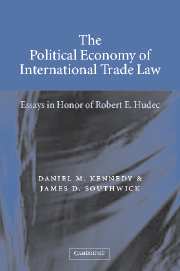Book contents
- Frontmatter
- Contents
- List of contributors
- Preface
- Foreword by E. THOMAS SULLIVAN
- Introduction: An overview of the volume
- Part I The constitutional developments of international trade law
- Part II The scope of international trade law: Adding new subjects and restructuring old ones
- Part III Legal relations between developed and developing countries
- 10 The Uruguay Round North–South Grand Bargain: Implications for future negotiations
- Comment: The Uruguay Round North–South bargain: Will the WTO get over it?
- 11 The TRIPS-legality of measures taken to address public health crises: Responding to USTR–State–industry positions that undermine the WTO
- Comment: The TRIPS Agreement
- 12 “If only we were elephants”: The political economy of the WTO's treatment of trade and environment matters
- Comment: The dynamics of protest
- 13 The Seattle impasse and its implications for the World Trade Organization
- Comment: Trade negotiations and high politics: Drawing the right lessons from Seattle
- 14 Developing country interests in WTO agricultural policy
- Comment: WTO and policy reform in developing countries
- Part IV The operation of the WTO dispute settlement procedure
- Bibliography of works by ROBERT E. HUDEC
- Index
12 - “If only we were elephants”: The political economy of the WTO's treatment of trade and environment matters
Published online by Cambridge University Press: 02 September 2009
- Frontmatter
- Contents
- List of contributors
- Preface
- Foreword by E. THOMAS SULLIVAN
- Introduction: An overview of the volume
- Part I The constitutional developments of international trade law
- Part II The scope of international trade law: Adding new subjects and restructuring old ones
- Part III Legal relations between developed and developing countries
- 10 The Uruguay Round North–South Grand Bargain: Implications for future negotiations
- Comment: The Uruguay Round North–South bargain: Will the WTO get over it?
- 11 The TRIPS-legality of measures taken to address public health crises: Responding to USTR–State–industry positions that undermine the WTO
- Comment: The TRIPS Agreement
- 12 “If only we were elephants”: The political economy of the WTO's treatment of trade and environment matters
- Comment: The dynamics of protest
- 13 The Seattle impasse and its implications for the World Trade Organization
- Comment: Trade negotiations and high politics: Drawing the right lessons from Seattle
- 14 Developing country interests in WTO agricultural policy
- Comment: WTO and policy reform in developing countries
- Part IV The operation of the WTO dispute settlement procedure
- Bibliography of works by ROBERT E. HUDEC
- Index
Summary
Mainstream US environmental groups were a core part of the protests at the 1999 World Trade Organization (WTO) Ministerial meeting in Seattle, having taken the lead throughout the 1990s in challenging the legitimacy of WTO decision-making. Their central claim is that WTO decisions on trade and environment issues are anti-democratic and thus lack legitimacy. This study takes their charges seriously, assessing the representativeness of those partaking in WTO negotiations to define a legal framework for addressing the interaction of trade and environmental policies. The basic question is who is represented and how are they represented in determining law's contours through the political process at the international level.
This study examines how the World Trade Organization has addressed trade and environment issues through the creation of a Committee on Trade and Environment (CTE), treating the CTE as a site to assess central concerns of governance – that is, who governs – in a globalizing economy. Northern environmental interest groups and many Northern academics criticize the Committee on Trade and Environment for failing to propose substantive changes to WTO law in order to grant more deference to national environmental policies. This essay, through its focus on the positions and roles of state and non-state actors, provides a better foundation to assess the democratic accountability of the WTO's handling of trade-environment matters.
- Type
- Chapter
- Information
- The Political Economy of International Trade LawEssays in Honor of Robert E. Hudec, pp. 349 - 393Publisher: Cambridge University PressPrint publication year: 2002
- 1
- Cited by



